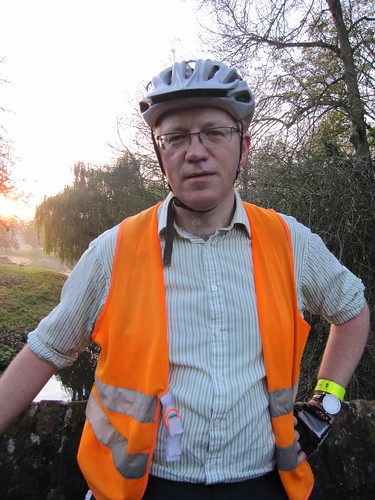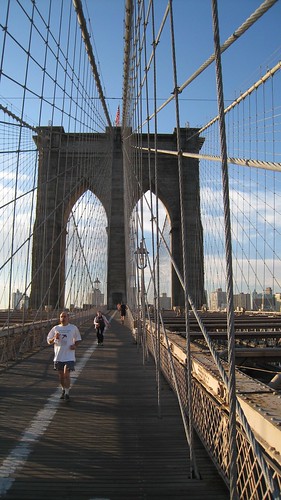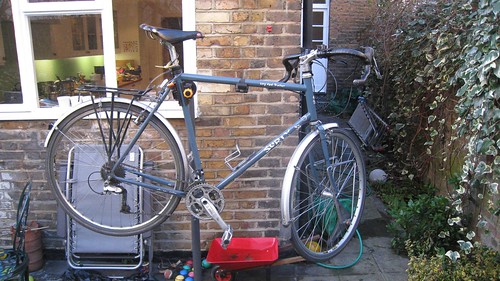“What was the problem back there?” I asked the motorist who
had sat behind my bike honking her horn. She said I’d been blocking the road. On
a four-lane road, I pointed out, a cyclist riding a car
door’s width from parked cars wasn't much of an obstruction. I also had as good a
right as she to use the road. “You don’t pay road tax,” she answered. Roads
were funded from general taxation, rather than a specific tax, I retorted – and,
I added, no respectable transport economist believes motoring taxes cover all the
costs of motoring pollution and other damage. As a higher-rate income tax payer,
I was subsidising her driving. She changed tack. “F*** off back to Scotland
It would be tempting to describe my partner in this impromptu
Socratic dialogue as typical of motorists in general – but unfair. There are,
of course, many considerate, thoughtful motorists – it could hardly be
otherwise in a decent, democratic country where cars account for the vast
majority of personal journeys. But I have had enough ecounters with angry
motorists – and read enough angry commentary from those exasperated with cyclists’
perceived shortcomings – to think that a sizeable minority share her feelings.
I’ve seen no evidence attitudes elsewhere in the world are significantly different
- and a fair amount that they’re much the same.
Parris and Martin subsequently half-apologised by saying
their columns had been meant as jokes. What comfort one is meant to draw from
the idea that Matthew Parris thinks it amusing to imagine cyclists being decapitated remains a mystery to me, however. I still wonder which other crimes
against fellow citizens the conservative, bourgeois Mail on Sunday would have
regarded it as a joke for one of its columnists to describe.
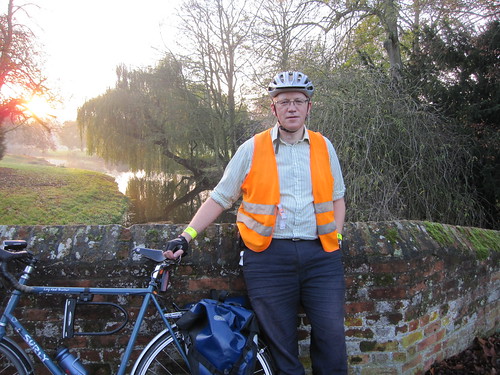 |
| A double provocation to the Angry Woman of Camberwell: me, with my bike and still in England. While I am normally invisible, sharp-eyed readers will spot me towards the centre of the bridge. |
The woman’s mentioning of my ethnicity was suggestive. Cycling
may be only a personal transport choice – but her attitude towards me as a
cyclist seemed of a piece with her casual racism. Her comment about my going “back” also illustrated
the dangers of jumping to conclusions about someone based on limited
information. I was, despite my accent, born in west London. Even if one
accepted the dubious idea that only Londoners should be in London, I probably
had at least as strong a claim on citizenship of the Capital as the Angry Woman
of Camberwell.
But the nature of some people’s feelings about cyclists is clear from what they write about us. In December 2007, Matthew Parris wrote
in The Times that life in his village would be better if someone strung piano
wire across the country lanes to decapitate passing cyclists. Cyclists, he
said, were responsible for the litter found in local hedgerows because the
litter was at cyclist, rather than runner, height. I’ve been trying ever since to
work out how different a cyclist’s height is from a runner’s. Around
the same time, a column in the Guardian – for which I can’t now find a precise
reference – complained about cyclists in general and in particular their “pompous
little plastic helmets”.
In September 2009, meanwhile, James Martin – a TV chef –wrote a car review for the Mail on Sunday of an electric sportscar. Having
mentioned in the piece his irritation at the number of cyclists riding on the
roads in his area, he wrote about how he had seen two cyclists ahead of him
when driving the silent car. He had, he wrote, deliberately accelerated as he
passed them - then honked the horn.
"The look of sheer terror as they tottered into the
hedge was the best thing I've ever seen in my rear-view mirror,” he wrote.
Matthew Parris’s column, the Guardian piece, James Martin’s
car review and Camberwell Motorist all seem to express an anger out of all
proportions to the anger’s stated motive. I had delayed the woman by
milliseconds from reaching the end of a traffic jam. Even if cyclists had been littering
in Matthew Parris’s hedgerows, it’s hard to see death is a reasonable
punishment. Helmets are no more capable of pomposity than any other inanimate
object – the columnist who imagined it was expressing only his own rage. James
Martin seemed content to describe himself committing a crime against cyclists
for no other reason than that they were there and vulnerable.
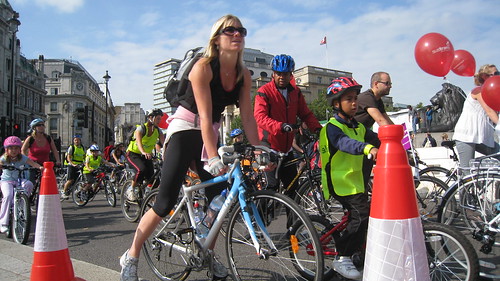 |
| Thousands of cyclists at the 2009 London SkyRide: decapitating them all would be messy - but, according to Matthew Parris, fair |
Such anti-cyclist anger reminds me in many ways of the feelings about gypsies that I would hear expressed when in lived in central Europe. In
Hungary, people would tell me they disliked gypsies because they were lazy and
dishonest. In Romania, some gypsy groups were unpopular because they were more
successful than most Romanians, and built large, vulgar houses to show it. The truth
was that gypsies – like, I would suggest, cyclists - were unpopular principally
for being different.
Humans seem to feel a rage against those who get away with
things they long to do – with the gypsies for seeming carefree and unconcerned
about bourgeois norms, with gay men who flaunt their feminine side, with cyclists
for skipping ahead of them to the front of the traffic queue. It would be wrong
to claim that cyclists – mostly, in London, articulate, middle-class men - face
anything like the problems that the perpetually victimised gypsies or blacks or
gays face. But I think the instincts have a similar genesis.
None of this of course would matter much either if the
sentiments expressed produced no real world consequences or if anything were
being done to tackle the prejudices. Yet there are real-world consequences –
and significant reluctance to tackle them.
Days after Matthew Parris’s Times column, I was cycling out
of Hyde Park across Knightsbridge one Saturday, heading towards home. Seeing me
heading towards a cycle-only section of road, a young man on the pavement aimed
a punch at me. He then guffawed with his friends at how his gesture made me
wobble. I met Ken Livingstone, the then mayor of London, a few days later when
he announced plans for what is now the London Cycle Hire Scheme. I recounted my
story and asked the mayor how he planned to stop such – fairly common –
behaviour from putting new cyclists off. He brushed it aside. “Well, I’ve often
felt like punching a journalist myself,” he droned, before launching into the
story of a constituent who, in his days as a member of parliament, had been
seriously injured when knocked down by a cyclist. Cyclists, he seemed to imply –
against all the evidence – were the real menace.
As long as veteran left-wingers like London’s former mayor
continue to make common cause with the worst parts of the right-wing press and
the least reflective motorists on cyclists’ rights, cycling in London – and many
other parts of the developed world – will remain an activity for the determined
few. When it becomes as unthinkable to joke about cyclists deserving death as
it rightly is about any other group, tempers on the roads might less easily get frayed.

